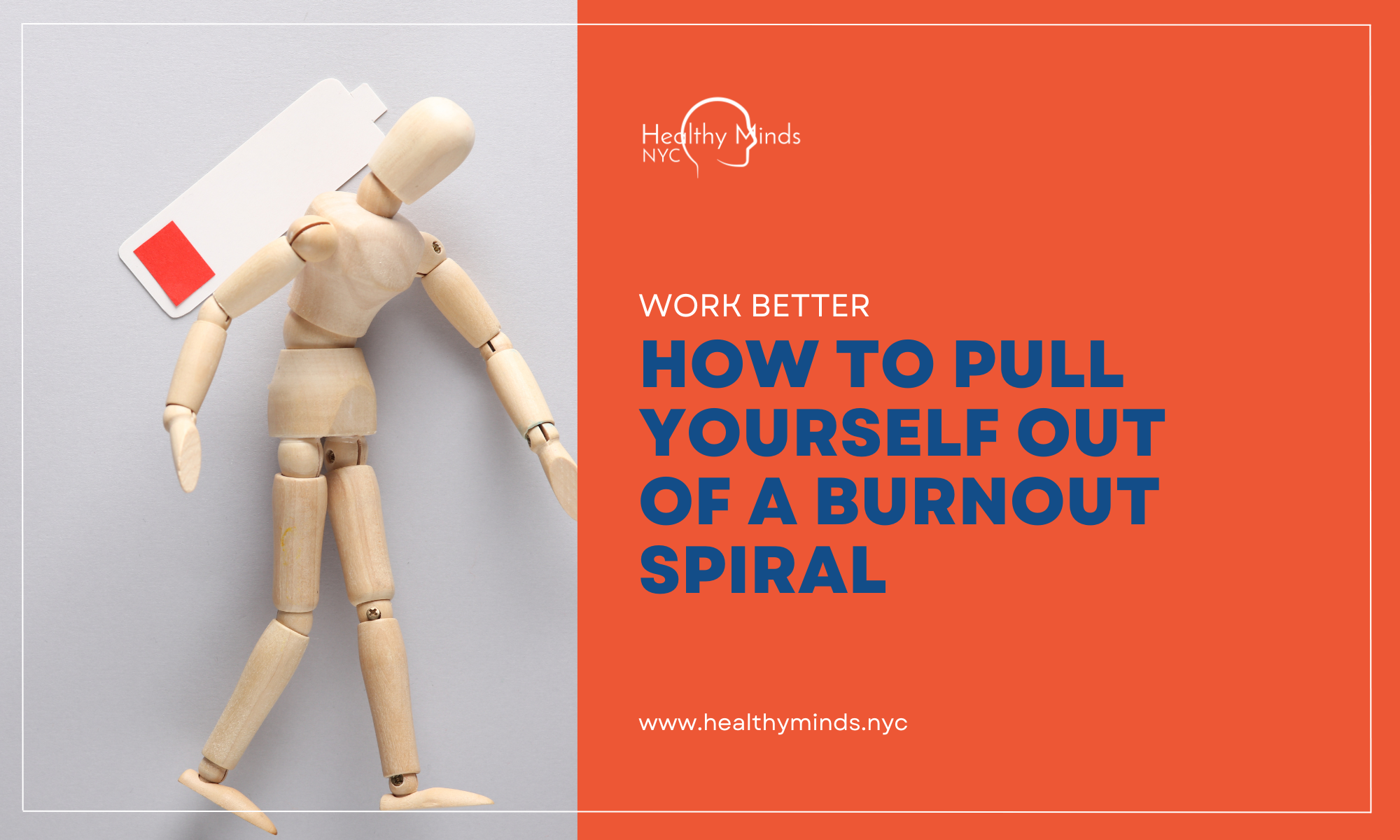OCD IN NEW YORK CITY
If you find yourself stuck in repetitive, ritualistic behaviors to soothe your negative thoughts and fears temporarily, you could have obsessive-compulsive disorder (OCD). At Healthy Minds NYC, our team of experienced and compassionate therapists offers personalized therapeutic approaches to treatment to help you recover from and manage OCD.
What is Obsessive-Compulsive Disorder (OCD)?
Do you have intrusive fears and negative thoughts that drive you to repetitive, ritualistic behaviors? These are hallmark signs of OCD.
Obsessions
In psychology, obsessions are repeated and unwanted thoughts that cause anxiety. An obsessive thought can appear out of thin air, and once it does, it’s hard to ignore.
Compulsions
A compulsion is a behavior that is performed in response to an obsession. A compulsion temporarily relieves the anxiety associated with the obsession. However, a compulsion does not provide lasting relief.
What is the Difference Between an Obsession and a Compulsion?
Obsessions are the negative thoughts and fears that trigger your need to complete your compulsions — the ritualistic behaviors that provide temporary relief from your worries.
Some common obsession themes include fear of:
Germs or contagions
Harming oneself or others
Acting out in an inappropriately sexual way
Blurting out something hurtful or “wrong”
Doing the wrong thing
Having an illness or disease
Making a mistake
Being misunderstood
Counting
Analyzing, arguing, and debating with your thoughts
Seeking reassurance
Avoiding certain people, places, activities, or things
Cleaning or hand washing
Arranging things in a specific manner
Desiring specific order
Checking and redoing repeatedly
Common types of compulsive behavior include:
How is OCD Treated?
Our team of expert therapists at Healthy Minds NYC provides personalized treatments for OCD. Depending on your needs, they might combine different evidence-based therapeutic approaches and use medication when necessary.
MEDICATION
PSYCHOTHERAPY
Using modalities like Cognitive Behavioral Therapy (CBT) or Exposure and Response Prevention (ERP may be effective treatment options to help you recognize behaviors of OCD that you wish to change. These therapeutic approaches challenge the negative thoughts and actions directly, empowering you to create new meaning and refrain from compulsive behaviors.
Additionally, Acceptance and Commitment Therapy (ACT) can be useful in helping you accept unwanted thoughts, tolerating the distress they may bring, and developing self-compassion to act according to your deeper values rather than anxieties.
In some cases, medications like selective serotonin reuptake inhibitors (SSRIs) are also necessary to support your psychotherapy sessions. The medication can help reduce the intensity and frequency of obsessions and compulsions, while therapy offers you tools to manage your symptoms as well as a safe place to process your experience. Our psychiatrists offer medication management services to ensure you use your medications correctly.
Living With OCD in NYC
The unpredictability of New York City presents a unique challenge for individuals living with OCD. In article on OCD for The New York Times, comedian Mike Sacks described the city as a place that offers free immersion therapy because people who have OCD are “out of our element, constantly on guard, wending our way through a barrage of horror triggers.”
If you’re concerned about OCD or feel like your symptoms are interfering with your life, request an appointment online today.
The city presents new disruptions and variables on every block that alter the meticulous routines people who experience OCD rely on to feel stable. As a result, living in New York City with OCD can feel like an endless cycle of exposure to new triggers and the development of an ever-shifting catalog of compulsions to follow.
More Resources About OCD in New York City
Tips for Balancing Motherhood & A Demanding Career
Being a mother is a full-time job, and having a demanding career adds another layer of complexity. It often feels like there are never enough hours in the day to juggle everything. But don't worry, supermoms! With the…
How to Pull Yourself Out of a Burnout Spiral
Feeling overwhelmed by the demands of city life? Burnout might be lurking closer than you think. Luckily, there’s a way out. In this blog, we'll explore how to pull yourself out of a burnout cycle and regain your energy and…
From Burnout to Balance: Tips for Achieving Work-life Harmony
In today's fast-paced world, balancing work and personal life sometimes feels like an uphill battle, and it can really take a toll on our well-being. But it doesn't have to be this way…
Frequently Asked Questions
-
At Healthy Minds NYC, we believe the right therapist is essential to your mental health journey. That's why we require all clients to start with a free 15-minute consultation call. Our experienced team will take the time to understand your unique needs and match you with a therapist who can help you achieve your goals. Don't wait to prioritize your mental health - schedule your consultation call today.
-
During this call we will create a care plan you can sustain by discussing the following:
the goals and preferences you have for therapy
the right therapist for you based on your needs and style
the schedule for your first session (virtual or in-person) and frequency of sessions
details about your out-of-pocket cost and insurance
any questions you may have regarding care so you’re confident to begin.
-
Healthy Minds NYC is an out-of-network provider. However, we do work with many major insurance plans. Visit our rates and insurance page here to learn how we can help you utilize your insurance benefits to reduce out-of-pocket costs.
-
We recommend you schedule a call with our care coordinator to discuss any major changes to your care. We know your time is valuable, and when you schedule a call, we can have all of your information prepared and ready so you can quickly get the answers you need. You can also text us via the chat feature on our website and our team is happy to respond during business hours with the best next actions you can take.






